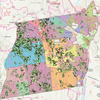'Stop the stigma,' says Summer's mom
After Summer Smith died last Jan. 9, her mother and her young son went through her box of special keepsakes. In the box was an edition of The Altamont Enterprise devoted to the aftermath of a 2000 crash on Hurst Road that killed two teens and wounded a third. The kids had been hotboxing — driving while stoned.
Summer, then a 17-year-old Guilderland High School senior, was friends with a classmate who died in the crash. Summer — a beautiful young woman with her hair pulled back in a ponytail and a ring piercing her eyebrow — is pictured in the paper holding a flier of the girl who had died: “Help keep the memory of all the kids that we have lost,” she had carefully written on a paper bordered with hand-drawn flowers.
Summer was raising money for a $19,000 bronze angel statue to stand in Altamont’s village green. “The angel represents people who have lost people,” Summer told us then. She also said, “No one would think this could happen to people our age.”
Her mother, Kristin Smith-Hoin, finds both irony and comfort in the keepsake. Summer died of a drug overdose. She was 31.
The bronze statue still stands in Altamont and Smith-Hoin planned to take Summer’s son, Richie, there to visit it. She is honest with Richie about his mother’s death.
She wants to share Summer’s story to end the stigma associated with drug addiction.
“Her life was worth so much more than how it ended up,” said Smith-Hoin. “If there’s one child that could be helped by this, then it’s worthwhile to tell the story.”
Dealing with a child hooked on drugs, Smith-Hoin said, affects “every minute you’re awake….She would call on the phone incessantly.”
One day Summer called Smith-Hoin while she was at work — she’s a nurse who manages a home health-care agency — gripped with paranoia. Smith-Hoin said paranoia is a typical side effect of drug use.
“Someone’s after me,” Summer told her. “We were looking in the bushes,” her mother recalled.
Drug addiction, Smith-Hoin surmises, is like living in a bad dream. “It takes you away from your family and your children and takes you to a casket.”
She also said, “Many times, drug abuse and mental health issues go hand and hand...Summer was recently diagnosed with borderline personality disorder, which is typical of someone who has a history of abuse, and also bipolar disorder. This makes the addiction even more difficult to treat, sometimes almost impossible.”
Underlying trauma
“She was the brightest, bubbliest child,” her mother recalled. A student at Lynnwood Elementary School in Guilderland, Summer’s report card said, “Summer eats very well, gets along well with others. She needs to not be so social and to stay at her desk,” her mother recalled.
She described her young daughter as “stubborn, precocious, and very lovable.”
Her mother went on, “In fourth grade, that all changed. She was a victim of sexual abuse.”
Her mother believes that the abuse is what led to Summer’s later drug use. “Recently I read that seventy-five percent of people who have used drugs have been traumatized in some way,” she said. “Instead of throwing them in jail, we need to help them.”
On learning of the abuse, by a family member, Smith-Hoin said, “Everything you thought to be true was turned upside down.”
Summer would wear only black and her personality changed. Although she got counseling as soon as her mother found out, “It could never be undone,” she said.
“We only in the last few years found out it went on for years,” she said of the sexual abuse.
The offender served seven-and-two-third years in prison for rape and sodomy.
“A lot of times addicts are covering up pain,” said Smith-Hoin. “There’s such a stigma,” she said of drug addiction. “It’s not just in the city. It’s here in Guilderland.”
Summer was 14 when she first asked her mother for help with drugs. “She said, ‘Mom, I’ve been getting high, smoking marijuana, and can’t stop.’” Smith-Hoin got her into a treatment program and took her to Alcoholics Anonymous meetings.
“In high school, she would always get in trouble,” said Smith-Hoin. “She said that every party you went to, there were drugs everywhere.”
Smith-Hoin’s husband, John Hoin, pointed out that Smith-Hoin had moved to Guilderland for the schools and said, “There are more drugs here because people have money.”
Summer “experimented with multiple drugs, including acid during her high school years,” her mother said and was suicidal, spending time at Healy House, a crisis residence for children at Parsons Child and Family Center in Albany.
Motherhood
“The next big surprise was that Summer was pregnant,” her mother recalled.
Her daughter said to her, “You know that thing that happened to you that you never wanted to happen to me…”
Smith-Hoin had been 17 when she gave birth to Summer, and 18 when her son, Daniel, was born.
Smith-Hoin responded to Summer’s news the same way her mother had responded when she was pregnant. “I said, ‘I can’t make this choice for you. I will support you whatever you decide.’”
Summer and her boyfriend decided to keep the baby. “He was the biggest blessing in her life,” Smith-Hoin said of Summer’s son, Richie.
The young couple got their own place and Smith-Hoin thought they were doing “relatively well.” They stayed together for almost a year and decided to separate. Summer got her own place and one afternoon, six months later, Smith-Hoin got a call from Summer’s current boyfriend. “Do you know Summer is addicted to heroin?” he asked. “She needs help,” he said.
“My world fell apart,” recalled Smith-Hoin. “Richie was removed from the household and went to live with his father while Summer got the help she needed.”
The addiction became a 12-year battle for summer.
Legally, Summer shared custody of Richie with her boyfriend and her mother. The arrangement, explained Smith-Hoin, gave a message to Summer about motherhood: “We’re saving this role for you.”
Smith-Hoin now takes great solace in reading the journal entries Summer made. “I’m so depressed, lonely, and lost,” Summer wrote. She believed she “let everyone down” and tried to kill herself.
In 2007, Summer wrote after a suicide attempt, “What was I thinking?” She reflected on how she had a little boy to care for. “It’s my job,” she wrote. “No one else can be his mother. I’m going to get it right.”
In 2013, Richie went to Oklahoma with his father, where he lives now with his father. Smith-Hoin said she was proud of Summer for agreeing to the move, calling it “selfless — putting her child’s needs first.”
Smith-Hoin and Summer took a trip to Ausable Chasm in the Adirondacks with Richie. “We talked to Richie for one-and-a-half hours about addiction on the way up,” Smith-Hoin said. “You don’t know you’re an addict until it’s too late,” Summer told her son. “I will always be an addict. I will always be in recovery.”
Smith-Hoin said, “I want to stop this cycle for her children and across the board. Our children are dying.”
Battling addiction
Summer gave her mother a poem about cocaine — “Heroin and cocaine were her drugs of choice,” Smith-Hoin said. “I’ll be your god, I’ll take your family,” the poem said.
“She said, ‘Mom, this is what it’s like.’”
Summer was in and out of jail for drug-related infractions; she spent time living on the street.
In her Bible while in jail, she wrote a note to God: “Give me the strength so I can win this battle.”
“Summer didn’t want to be an addict,” her mother said. “Summer just wanted to be Summer and be loved.”
She went on, “There were so many ups and downs, I can’t tell you. She wanted to be clean and sober. She wanted to be loved and normal.”
When addicts get close to succeeding, Smith-Hoin said, they often “create a crisis.”
Summer was “in and out of t10 rehabs,” her mother said. “You have to deal with the underlying trauma or you’re just carrying the pain,” she said.
Smith-Hoin compared healing an addict to treating a bedsore. “You need to heal it from within, so it heals the right way with new fresh skin. If you don’t do that, it will leave a wound underneath the skin.”
Turn-around
The Schenectady Drug Court turned her life around. “I was so proud of her for selecting Drug Court,” her mother said. “It’s the hard way.”
Instead of being jailed, people with non-violent crimes attend meetings, receive court-mandated treatment, and undergo regular drug tests.
“Richie was so proud, he went with her to the Drug Court Office when she received her certificate for graduating to Phase II of the program,” said Smith-Hoin. “We’re not ashamed of Summer. We want to be honest and to educate her children. We need to stop the stigma.”
“The year before she died was her best year,” said John Hoin.
“Drug Court made a difference,” said her mother. “It gives an opportunity not just to be put in jail and back on the street, but to turn their lives around.”
“We had the best year of our life,” said Smith-Hoin, echoing her husband. “For the first time since she lost her apartment in 2012, she had a room she could call her own.” Summer lived at the YWCA in Schenectady. “She became so much more positive, more herself,” her mother said.
The unexpected end
Summer worked with a therapist who specialized in sexual abuse and trauma. But she suffered a huge setback when she looked up the man who had abused her, now out of jail. “She wanted him to say, ‘I’m sorry.’ Instead, he blamed her,” said Smith-Hoin.
“She started to slip with drink. As the feelings came up, the alcohol went down,” said Smith-Hoin.
Her mother said, “Now she felt rejected again…She never could love herself.”
Summer spent New Year’s Eve sober with her mother; they watched a movie and ate five-layer dip in bed together. She spent the rest of her weekend with her mother and children. On Sunday afternoon, Smith-Hoin dropped off Summer at the Y; it was the last time she saw her alive.
“I know she wasn’t intending to end her life,” she said.
Smith-Hoin spoke to Summer last on the morning of Jan. 8. Summer was feeling ill and told her mother she was going to go to urgent care.
Smith-Hoin called her daughter repeatedly after that but couldn’t rouse her. “She always had her phone with her. Her phone is buried with her,” she said.
Her calls went unanswered.
“For the past year, we were in constant communication. This was reminiscent of when she was on the street,” said Smith-Hoin of the unanswered calls.
When Smith-Hoin called the desk at the Y, a woman checked on Summer and said she was sleeping.
“Did you try to rouse her?” Smith-Hoin asked.
The next phone call to Smith Hoin was dire: Summer was not responsive and 9-1-1 had been called.
“Summer had ODed before,” her mother said. She thought to herself, “We’ve survived this.”
“I get into addict mom’s mode,” she said, but it was too late. Summer was dead.
“I screamed, ‘No!’…Don’t let them take her. I have to hold her,” Smith-Hoin recalled.
Because it was an “unattended death,” Smith-Hoin said, she had to wait until the police said she could see her daughter. “I held her hand and sat next to her.”
Smith-Hoin wanted to know what had killed her daughter. She learned there was “a drug in her system she never used, PCP….I think she was doing Spice and it was laced,” she said. (See editorial.)
“She had synthetic cannabis,” said Smith-Hoin. “She found a way to smoke this stuff. You can buy it in a bodega; it’s marked ‘not for human consumption.’”
She went on, “I will never know what caused her death…She fell asleep in her bed and all indications point to her going into cardiac arrest, never knowing it was her last day.”
Legacy of courage and love
Smith-Hoin is finding good homes for her daughter’s possessions — her furniture went to a recovering addict who hadn’t had a home before. She is hanging on to Summer’s journals and Bible, to a swatch of her hair, and to the cell phone that has the last message from her daughter.
Smith-Hoin treasures a book of memories put together for Summer’s children — Richie, now 13; Anthony, 5; and Caden, 4. “Your mom had the most infectious laugh and smile,” wrote Lauren Trunko of the YWCA. “She made no apologies for who she was and she didn’t have to. Summer had a heart of gold with jewelry to match.
“Your mom was so kind to everyone. One of the older women who lived at the YWCA couldn’t afford a winter coat. Without telling anyone else, your mom went out and bought her one so she wouldn’t be cold.”
Smith-Hoin has some favorite memories to comfort her, too.
The month before Summer died, they went together to a Jim Brickman concert. “Summer was giggling and the snow was coming down. It was the most magical night,” said Smith-Hoin.
Brickman sang “That Silent Night”: “Snow came down that silent night,” he sang. “It was quite a sight to see. There were whispers and bells and angel wings. And you were holding me.”
“For one month after she died, all I did was play that. It kept alive that last, wonderful night,” said Smith-Hoin.
Summer trained to run a 5K race as part of a program for survivors of domestic violence.
Lauren Trunko wrote to summer’s children about that, too. “Her and I, side by side, pushing through the pain, the rain, and freezing cold wind on our faces. She pushed me,” Trunko wrote, “and I pushed her. Especially as we approached the finish line! One step at a time, one foot in front of the other until we reached the finish line. Such is life, when you don’t know what else to do and aren’t sure you can go on, just put one foot in front of the other, feel the cool breeze on your face and think of your mom — you will reach your finish line.”
Before Summer ran in the Jingle Bells Run, Smith-Hoin “bent down and put jingle bells on her running shoes.” Through tears, she said, “My best last memory was putting those bells on her feet and being so proud when she crossed the finish line.”
The shoes, with bells tied to the laces, are displayed in her home.
Smith-Hoin is now planning a 5K run for next spring to raise awareness of addiction. She has become a runner herself.
“What it gives us was what it gave Summer — empowerment and the ability to get through something you don’t think you can. It gets me through — thinking of Summer running and laughing with this group.”
She also said, “I’m not angry. I’m sad. I have not questioned God one time...Do I miss her dearly with every breath? Yes, I would want this for no other family.”
When an elderly uncle died in December, in Pennsylvania, where Smith-Hoin was raised, the family made a trip to the cemetery there. “My mother and grandparents are buried there and I will be, too,” said Smith-Hoin.
On the December trip to the cemetery, Summer asked, “Is there room for me here?”
She was buried there, in the bridesmaid’s dress she was to have worn at her brother Daniel’s wedding.
Her tombstone is inscribed with these words: “Free at last.”


